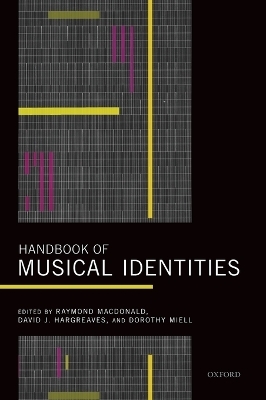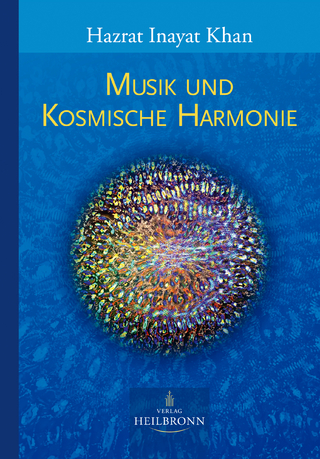
Handbook of Musical Identities
Oxford University Press (Verlag)
978-0-19-967948-5 (ISBN)
Music is a tremendously powerful channel through which people develop their personal and social identities. Music is used to communicate emotions, thoughts, political statements, social relationships, and physical expressions. But, just as language can mediate the construction and negotiation of developing identities, so music can also be a means of communication through which aspects of people's identities are constructed. Music can have a profound influence on our developing sense of identity, our values, and our beliefs, be it from rock music, classical music, or jazz.
Musical identities (MacDonald, Hargreaves and Miell, 2002) was unique in being in being one of the first books to explore this fascinating topic. This new book documents the remarkable expansion and growth in the study of musical identities since the publication of the earlier work. The editors identify three main features of current psychological approaches to musical identities, which concern their definition, development, and the identification of individual differences, as well as four main real-life contexts in which musical identities have been investigated, namely in music and musical institutions; specific geographical communities; education; and in health and well-being. This conceptual framework provides the rationale for the structure of the Handbook.
The book is divided into seven main sections. The first, 'Sociological, discursive and narrative approaches', includes several general theoretical accounts of musical identities from this perspective, as well as some more specific investigations. The second and third main sections deal in depth with two of the three psychological topics described above, namely the development of and individual differences in musical identities. The fourth, fifth and sixth main sections pursue three of the real-life contexts identified above, namely 'Musical institutions and practitioners', 'Education', and 'Health and well-being'. The seventh and final main section of the Handbook - 'Case studies' - includes chapters which look at particular musical identities in specific times, places, or contexts.
The multidisciplinary range and breadth of the Handbook's contents reflect the rapid changes that are taking place in music, in digital technology, and in their role in society as a whole, such that the study of musical identity is likely to proliferate even further in the future.
Raymond MacDonald is Professor of Music Psychology and Improvisation and Head of The School of Music at University of Edinburgh. He runs music workshops and lectures internationally and has published over 70 peer reviewed papers and book chapters. He has co-edited four texts, Musical Identities (2002), Musical Communication (2005), Musical Imaginations (2012) and Music Health & Wellbeing (2012) and was editor of the journal Psychology of Music between 2006 and 2012. His on-going research focuses on issues relating to improvisation, musical communication, music health and wellbeing, music education and musical identities. As a saxophonist and composer he is a founding member of The Glasgow Improvisers Orchestra and has released over 60 CDs. Collaborating with musicians such as David Byrne, George Lewis, Evan Parker, Jim O'Rourke and Marilyn Crispell he has toured and broadcast worldwide and has written music for film, television, theatre, radio and art installations. David Hargreaves is Professor of Education and Froebel Research Fellow at the University of Roehampton, and has previously held posts in the Schools of Psychology and Education at the Universities of Leicester, Durham and the Open University. He has been Editor of Psychology of Music, Chair of the Research Commission of the International Society for Music Education (ISME), and is a Fellow of the British Psychological Society. His books, in psychology, education, the arts, and music have been translated into 15 languages. He has appeared on BBC TV and radio as a jazz pianist and composer, and is organist on his local village church circuit. Dorothy Miell is Professor of Social Psychology based at the University of Edinburgh where she is also Vice Principal and Head of the College of Arts, Humanities and Social Sciences. She is a Fellow of the British Psychological Society and of the Royal Society of Edinburgh. She has worked on issues of identity, relationships and communication as they apply to creative collaborations in childhood, adolescence and amongst professional artists. Amongst her other co-edited texts are Musical Identities (2002), Learning to Collaborate, Collaborating to Learn (2004), Collaborative Creativity (2004), Musical Communication (2005) and Musical Imaginations (2012).
EDITORS' INTRODUCTION; SOCIOLOGICAL, DISCURSIVE AND NARRATIVE APPROACHES; DEVELOPMENT; INDIVIDUAL DIFFERENCES; MUSICAL INSTITUTIONS AND PRACTITIONERS; EDUCATION; HEALTH AND WELL-BEING; CASE STUDIES
| Erscheinungsdatum | 01.03.2017 |
|---|---|
| Verlagsort | Oxford |
| Sprache | englisch |
| Maße | 178 x 252 mm |
| Gewicht | 1696 g |
| Themenwelt | Kunst / Musik / Theater ► Musik ► Musiktheorie / Musiklehre |
| Geisteswissenschaften ► Psychologie ► Sozialpsychologie | |
| Sozialwissenschaften | |
| ISBN-10 | 0-19-967948-7 / 0199679487 |
| ISBN-13 | 978-0-19-967948-5 / 9780199679485 |
| Zustand | Neuware |
| Informationen gemäß Produktsicherheitsverordnung (GPSR) | |
| Haben Sie eine Frage zum Produkt? |
aus dem Bereich


